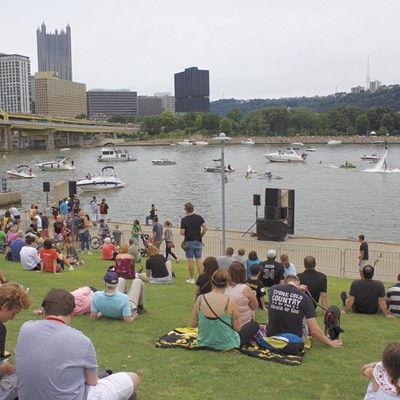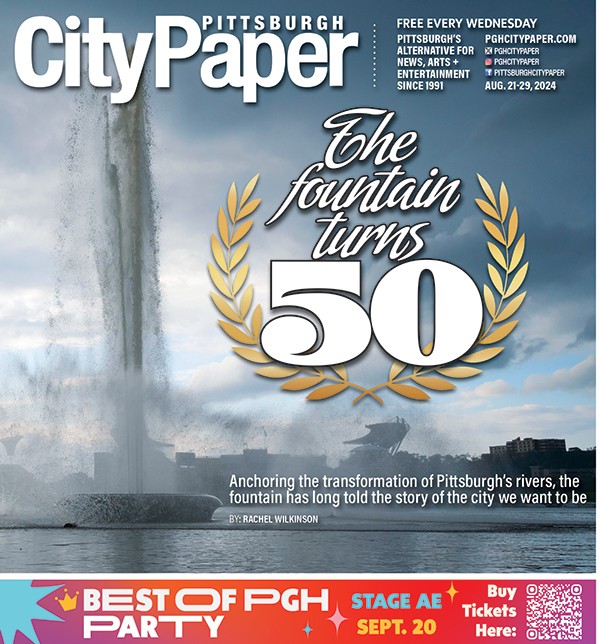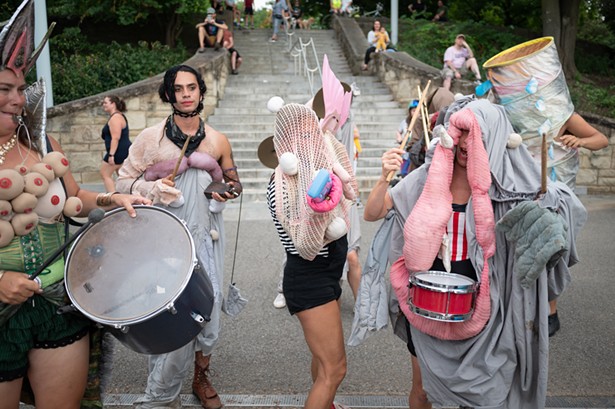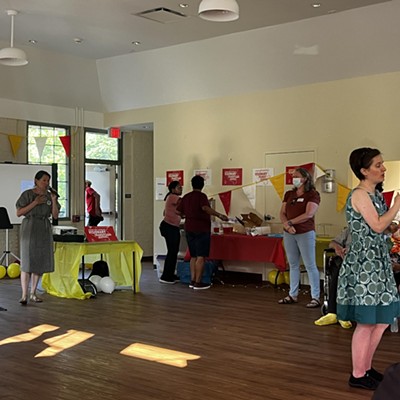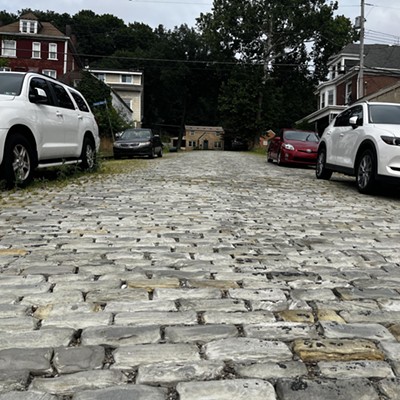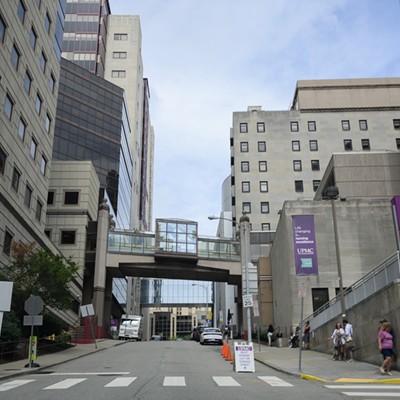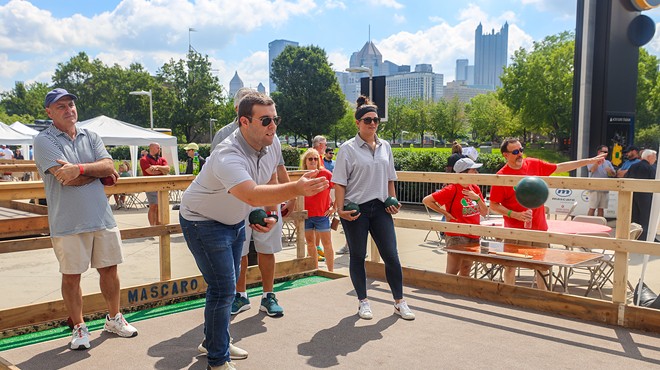For voters in Pittsburgh, there was little new in this November's election -- just a mayoral candidate everyone already knew was going to win. If you wanted excitement, you had to live in one of the region's hotbeds for change -- old river-valley mill towns.
While it's easy to overlook from within city limits, this November ushered some new political faces just beyond our borders, and showed that they still face the same old challenges. A grassroots political coalition called Neighbors Unite Wilkinsburg achieved almost a clean sweep in that once-affluent eastern suburb of about 20,000. Come January, Wilkinsburg will see a new mayor and three new borough councilors from the NUW slate. On top of a high poverty rate and other challenges, Wilkinsburg had been afflicted by years of absurdly tumultuous municipal government, highlighted by employee turnover, lawsuits and alleged corruption. Winning council candidate Tracey Evans is hoping, among other things, to bring some stability and competence to her borough council.
Just southeast of Wilkinsburg, next to the Monongahela River and one of the valley's last operating steel mills, sits Braddock (population 3,000), another troubled municipality. There, John Fetterman, an adult-ed teacher and youth counselor, won a campaign for mayor of Braddock, thanks partly to the support of his youthful G.E.D. students.
Meanwhile, upstream in Brownsville, a depressed Mon River coal town in Fayette County, the town's first female mayor, Norma Ryan, was narrowly defeated for re-election after four years in office by a more conventional candidate who criticized her efforts to network with similar towns across the state. Brownsville also has about 3,000 people.
City Paper gathered these three atypical local politicians to talk about bringing new ideas to old towns. We also invited local government veteran Mayor Betty Esper of Homestead (population about 3,500), who hosted the group in her office. Esper, a U.S. Steel retiree, became the first female mayor there in 1991, and the first woman borough councilor in 1980.
CP: All of you are from old towns with great histories but an economically troubled present. What are some of your redevelopment issues?
John Fetterman, Braddock: I think the biggest issue is the Mon-Fayette Expressway. I don't know who it's going to put me at odds with, but I oppose the Mon-Fayette. It'll take another 75 buildings out of downtown. And there'll be a Turnpike exit right in the middle of it. ... Every highway the Turnpike has built, they've promised Shangri-La, and it hasn't materialized. Braddock already has profoundly inexpensive housing that's lovely. You can get a code-ready house for $15,000 or less. I own a couple! I rent-to-own them to the young people. You can't even get a new car for what you can get a house for in Braddock.
Tracey Evans, Wilkinsburg: That's great if [the houses] aren't vacant, but houses that have been vacant [can] accumulate thousands of dollars in tax liens.
Norma Ryan, Brownsville: When you have these absentee owners, I know eminent domain is not a good word, but let's give the house to somebody with the stipulation that within a year it must be on the tax rolls, and you must occupy it for five years.
Evans: The county could be more proactive with landlords who don't pay their taxes but still collect their Section 8 [rental] subsidy. Twenty-eight percent of the county's Section 8 housing is in Wilkinsburg. We have one landlord who has about 65 properties who doesn't pay his taxes.
CP: A lot of people say: Why even try to bring new ideas to old towns? Why not chase your bliss in Cranberry?
Betty Esper, Homestead: I think you [Evans and Fetterman] are so young you ought to have some ideas. I look at Braddock, and I see you've got a lot to do.
Fetterman: I have no illusions.
Esper: You're young enough and energetic enough to pull in younger people to help you. Nothing against us older generation. I'm 72, so I can talk. There's organizations that can help you, with housing and so on.
Fetterman: They're building new homes in Braddock and North Braddock, but they aren't selling that quickly. Unfortunately, right across the street from some of them, there was just a double homicide. I'd like to create a youth engagement center, someplace to keep young people off the streets, and maybe avoid some of the things that led to the two young men being shot to death. Even North Braddock lacks any kind of youth magnet.
CP: It seems that young people would have needs in all of your communities.
Ryan: It's a different world for the young people than it was 30-40 years ago, so you have to be creative. We have junior councilpeople. Also, we have about 20 students in a grant-funded program, and we're teaching them to refurbish computers after school for, I think, eight hours a week. It's an alternative to being on the streets.
Evans: That was the number-one thing people said when I was going door-to-door: "What are you going to do about the kids on the streets?" In our case, it was small kids running around unsupervised. I debate whether it's local government's job. We have 35 to 40 churches in Wilkinsburg, and they all have programs, but there's no good way to get the word out. We don't have a community newspaper or newsletter.
CP: There are no specific social-services duties for municipal government, but constituents ask for that. How do you balance these tasks with traditional duties like public works?
Esper: There is no balance! There's no effort by our council to get involved in the community. They think their job is just to run the council. We'll have Light-Up Night on Tuesday, and if I see one councilperson I'll be happy.
CP: How do they stay elected?
Esper: I guess [blame] the idiots that vote for them.
Evans: I'd say our current council has gone too far trying to play roles in social service. I think we need to balance that with [other] needs. We can barely keep a public works force to maintain our parks.
Ryan: I see the role of the mayor as being a lot more than overseeing the police department. By networking, I was able to bring the governor to Brownsville for the first time ever. And we've been able to start a relationship with the governor to revitalize the town.
CP: At the county level, municipal consolidation is often held up as a cure-all ...
Esper: Everyone's for it but nobody wants to give anything up.
Ryan: Politicians don't want to lose their power.
Esper: Not only the politicians. If they said we were to merge our three boroughs, there's residents who would have a fit. Let's face it: I'm in a community that's mostly black, I've got West Homestead that's 70 percent white, and I've got Munhall that's probably 90 percent white, and you think they're going to merge? It's a racial issue. We merged to form the school district and that's the worst thing we ever did. We don't feel like we're part of the Steel Valley [school district]. We don't even have a representative on the board. They call it Munhall High, because everybody on the board is from Munhall. But whose fault is that, if [we] don't run?
The only way you're going to merge is by forced merging: No grant will be given to anybody unless you merge. But they don't have the balls to do that.
Fetterman: Nobody's going to hitch their wagon to us. We've got everything to gain and nothing to lose by hitching our wagon. Even North Braddock keeps us at arm's length -- you wanna try talking to Edgewood?
Evans: They might take a few blocks of Wilkinsburg, but they won't want to work with us much.
CP: To what degree is your own town's pessimism or fatalism a problem?
Evans: We had a very difficult time recruiting people to run for office. There was a lot of enthusiasm for new candidates because we've had five borough managers, five police chiefs, five finance directors in the past eight years, and lawsuit after lawsuit in our local government. The majority of us who ran were in neighborhood groups, park cleanup, or block club. None of us wanted to run ... I have small children, other people have businesses, but there was a huge support from the community.
CP: Do you have old boys' networks in your town? And should you try to become an "old boy" yourself?
Esper: Well, when you're dealing with police, they just look at you as a female sometimes. But I worked in the mill for 36 years. So I know all the four-letter words, too. I can f-you off too, but that's not the way I work.
Ryan: I love to see two young people getting involved. That's what we need.
Evans: I think a lot of young people did run this time. Out of six elections in Wilkinsburg, four [winners] at least are under 45. I think there's people all around the county who've said, "Yeah, we've got kids or two jobs, or whatever, but we've gotta do this."
Ryan: The thing I think you young ones should realize is: Use your title! Call up and say, "I'm the mayor." You use that title and it opens doors.
Esper: Here's a simple thing today. We have Light-Up Night, with maybe 200 Eat 'n Park cookies, and get 'em every year. I pick up the phone, I hear [from Eat 'n Park], "Our budget is out and depleted, maybe next year." I said, "What in the hell are you talking about? I'm asking for 200 cookies, you know." Something about writing a letter, six months ahead of time. I said, "This is Homestead! This is Light-Up Night for Homestead!"
CP: And did you get your cookies?
Esper: Yeah, I got my cookies!
CP: What's a strength for your community to build on?
Evans: Definitely the housing stock. Just beautiful houses, the proximity to the city and the accessibility to the East Busway and Frick Park.
Ryan: Our assets are probably our potential for tourism and recreation. We're right on the river, and we're in two heritage zones, Steel Industry Heritage and also the National Road. We need to build on our heritage, and maybe bring people out of city life to experience rural life.
Evans: No, no! Keep 'em in the city!
Fetterman: This might sound strange, but I think Braddock's asset might be its complete lack of assets. I mean, some of our buildings don't have roofs! Maybe it can capture someone's imagination. It's small enough to make an impact, but large enough to get people's attention.
Esper: I think the asset of Homestead is the history of Homestead, the steel industry.
Fetterman: As mayor of Braddock, I have to say, We've got steel!
Ryan: And guys, if it weren't for the coal from Brownsville, how would you get steel?
Esper: We're celebrating our 125th anniversary this year. You can't talk to anyone who can't talk to you about the history of Homestead. We had the 1892 strike!
Ryan: Are we just that throwaway society, is that what America should be known as? No. Southwest Pennsylvania -- the steel capital of the world, the national road that opened the west -- as I keep trying to promote, you can really tell the story of the making of America. It's all here.


